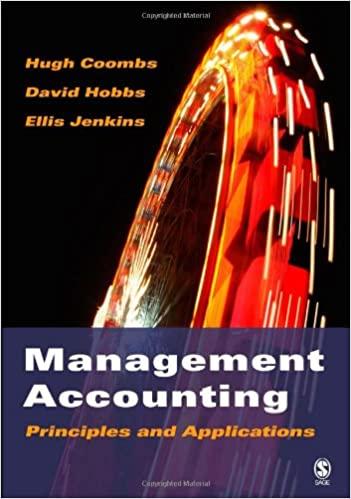Question
Kaymer Industries Inc. uses a job order cost system. The following data summarize the operations related to production for January, the first month of operations:
Kaymer Industries Inc. uses a job order cost system. The following data summarize the operations related to production for January, the first month of operations:
| a. Materials purchased on account, $33,100. | |
| b. Materials requisitioned and factory labor used: |
| Job | Materials | Factory Labor |
| 301 | $2,740 | $5,460 |
| 302 | 3,980 | 2,930 |
| 303 | 2,570 | 3,070 |
| 304 | 8,850 | 8,520 |
| 305 | 6,210 | 1,840 |
| 306 | 4,290 | 6,110 |
| For general factory use | 1,200 | 4,520 |
| c. Factory overhead costs incurred on account, $6,470. | |
| d. Depreciation of factory machinery and equipment, $1,790. | |
| e. The factory overhead rate is $65 per machine hour. Machine hours used: |
| Job | Machine Hours |
| 301 | 52 |
| 302 | 28 |
| 303 | 44 |
| 304 | 65 |
| 305 | 36 |
| 306 | 79 |
| Total | 304 |
| f. Jobs completed: 301, 302, 303, and 305. | |
| g. Jobs were shipped and customers were billed as follows: Job 301, $23,450; Job 302, $19,210; Job 303, $17,360. |
| Required: | |||
| 1. | Journalize the entries to record the summarized operations. Record each item (items a-f) as an individual entry on January 31. Record item g as 2 entries. Refer to the chart of accounts for the exact wording of the account titles. CNOW journals do not use lines for journal explanations. Every line on a journal page is used for debit or credit entries. CNOW journals will automatically indent a credit entry when a credit amount is entered. | ||
| 2. | Post the appropriate entries to T accounts for Work in Process and Finished Goods, using the identifying letters as transaction codes. Determine the correct ending balance. The ending balance label is provided on the left side of the T account even when the ending balance is a credit. The unused cell on the balance line should be left blank. | ||
| 3. | Prepare a schedule of unfinished jobs to support the balance in the work in process account.* | ||
| 4. | Prepare a schedule of completed jobs on hand to support the balance in the finished goods account.*
|
Chart of Accounts
| CHART OF ACCOUNTS | |||||||||||||||||||||||||||||||||||||||||||||||||||||||||||||||||||||||||||||||||||
| Kaymer Industries Inc. | |||||||||||||||||||||||||||||||||||||||||||||||||||||||||||||||||||||||||||||||||||
| General Ledger | |||||||||||||||||||||||||||||||||||||||||||||||||||||||||||||||||||||||||||||||||||
|
| ||||||||||||||||||||||||||||||||||||||||||||||||||||||||||||||||||||||||||||||||||
Amount Descriptions
| Amount Descriptions | |
| Job No. 301 | |
| Job No. 302 | |
| Job No. 303 | |
| Job No. 304 | |
| Job No. 305 | |
| Job No. 306 |
Journal
1. Journalize the entries to record the summarized operations. Record each item (items a-f) as an individual entry on January 31. Record item g as 2 entries. Refer to the chart of accounts for the exact wording of the account titles. CNOW journals do not use lines for journal explanations. Every line on a journal page is used for debit or credit entries. CNOW journals will automatically indent a credit entry when a credit amount is entered.
PAGE 10
JOURNAL
ACCOUNTING EQUATION
| DATE | DESCRIPTION | POST. REF. | DEBIT | CREDIT | ASSETS | LIABILITIES | EQUITY | |
|---|---|---|---|---|---|---|---|---|
| 1 |
|
|
|
|
|
|
|
|
| 2 |
|
|
|
|
|
|
|
|
| 3 |
|
|
|
|
|
|
|
|
| 4 |
|
|
|
|
|
|
|
|
| 5 |
|
|
|
|
|
|
|
|
| 6 |
|
|
|
|
|
|
|
|
| 7 |
|
|
|
|
|
|
|
|
| 8 |
|
|
|
|
|
|
|
|
| 9 |
|
|
|
|
|
|
|
|
| 10 |
|
|
|
|
|
|
|
|
| 11 |
|
|
|
|
|
|
|
|
| 12 |
|
|
|
|
|
|
|
|
| 13 |
|
|
|
|
|
|
|
|
| 14 |
|
|
|
|
|
|
|
|
| 15 |
|
|
|
|
|
|
|
|
| 16 |
|
|
|
|
|
|
|
|
| 17 |
|
|
|
|
|
|
|
|
| 18 |
|
|
|
|
|
|
|
|
Step by Step Solution
There are 3 Steps involved in it
Step: 1

Get Instant Access to Expert-Tailored Solutions
See step-by-step solutions with expert insights and AI powered tools for academic success
Step: 2

Step: 3

Ace Your Homework with AI
Get the answers you need in no time with our AI-driven, step-by-step assistance
Get Started


